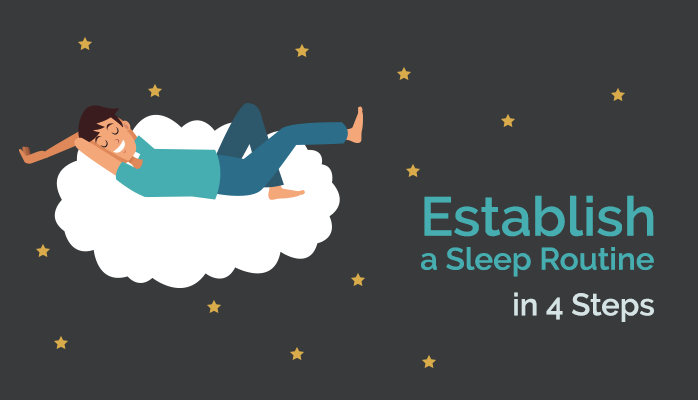
According to a 2016 CDC press release, 1 in 3 American adults don't get enough sleep. The American Academy of Sleep Medicine and the Sleep Research Society recommends that adults aged 18-60 get at least 7 or more hours of shut-eye per night. However, with more than a third of Americans getting less than the recommended 7 hours, our nation is sorely lacking in quality slumber.
In response to this finding, Wayne Giles, M.D. and director of the CDC's Division of Population Health, remarked, "Lifestyle changes such as going to bed at the same time each night, rising at the same time each morning, and turning off or removing televisions, computers, mobile devices from the bedroom, can help people get the healthy sleep they need."
Giles' suggestions inspired us to share 4 steps towards achieving better sleep at night by establishing a sleep routine. With so many Americans struggling to get consistent, healthy sleep, we hope that these tips will act as motivators to create wholesome lifestyle habits that will set the stage for better and longer nights of quality rest.
1. Fall asleep and wake at the same time daily
As Giles stated in his comment, setting up a schedule of sleeping and waking at specific times every day, including weekends, will allow your body to establish a consistent body clock. This is your circadian rhythm, defined by the National Sleep Foundation as a 24-hour internal clock that is running in the background of your brain and cycles between sleepiness and alertness at regular intervals.
When you stay consistent, you allow your circadian rhythm to ease your body into its natural cycle of sleep.
2. Eliminate technology from the bedroom
One of the most impacting changes to healthy sleep cycles has been the introduction of electronic devices. Gadgets such as cell phones, tablets, and television's influence sleep negatively for several reasons.
First, technological devices emitting blue light suppress melatonin. Melatonin, the hormone that controls sleeping and waking cycles, is reduced in the body when we are exposed to light. Second, people struggle with sleep when they engage their brains in a task such as checking their email inboxes or watching a movie.
Instead of allowing our minds to unwind, we stimulate our brains with more information. This will naturally keep people awake instead of allowing them to ease into sleep. Third and finally, technological devices wake people up with dings, bells, vibrations, and other alerts that disturb quality sleep.
Even if a device is on 'silent' mode, knowing that a gadget is within reach disallows the brain to completely disengage with it. Therefore, removing all pieces of technology from the bedroom and investing in an alarm clock is the best answer to achieving the longest and best possible sleep.
3. Make your bedroom a comfortable space
Taking steps towards designing a peaceful bedroom will help to create the proper atmosphere to encourage rest. A few ways to make comforting changes include using earplugs to reduce noise and taking lights completely out of the room.
Blackout curtains or room-darkening shades are a worthy investment if an excess of sunlight streams in through your bedroom window. In addition, having a supportive mattress and cozy pillows that are suited to your body and your health is recommended.
4. Practice relaxation techniques
Finally, incorporating relaxing habits into your bedtime routine will allow you to settle down and ease your mind from the day. Examples of these habits include creating a music relaxation playlist, taking a warm bath with bubbles and calming essential oils, and drinking some bedtime tea. Calming herbs to utilize for relaxation include chamomile, lemongrass, passionflower, and St. John's Wort. Furthermore, integrate a soothing before bed activity into your before-bed schedule such as gentle yoga or meditation.
By taking these 4 tips into account, you can successfully establish a bedtime routine that will encourage rest and allow you to achieve the best sleep possible. Being proactive in developing a consistent nighttime routine is vitally important to your long-term health.
If you are unable to get the recommended 7 hours of sleep after refining your sleep routine, you may be facing a more serious health problem. Sleep disorders affect more than 40 million Americans and prevent them from getting a quality night's rest.
If you believe that you may be suffering from an undiagnosed sleep disorder, you can contact us directly at the Anchorage Sleep Center by sending us a message or click the blue button below. From there, our professional team of sleep specialists will consult with you to help you get the answers you need to get the sleep you need to actualize your most productive, healthy, and active life.

